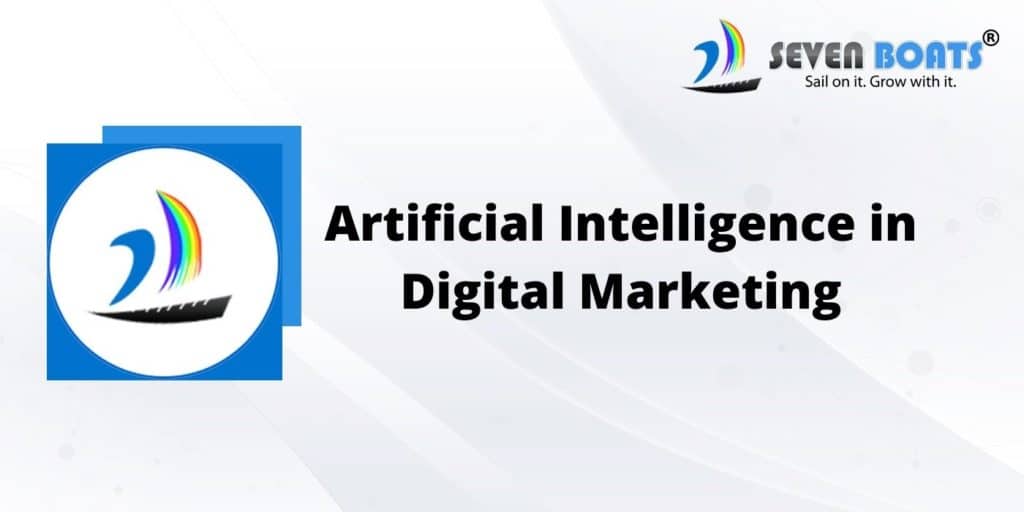
Introduction
Artificial Intelligence in Digital Marketing – Rise of the Robot Era: The application of Artificial Intelligence (AI) in digital marketing is becoming increasingly popular and is proving to be an integral part of any digital marketing strategy. Artificial Intelligence (AI) has become a crucial part of digital marketing, enabling brands to deliver more personalized customer experiences and make data-driven decisions. AI can analyze vast amounts of data to identify trends and insights, automate tasks, and improve marketing efficiency.
AI has been around for a while now, and its use in digital marketing is becoming more prevalent. But what is artificial intelligence, exactly? And how is it changing the way businesses operate online? In this blog post, we will explore the history of artificial intelligence and discuss how it is being used to change digital marketing as we know it. We will also look at some specific applications of AI in digital marketing that can help your business reach new heights.
Thanks largely to sci-fi movies, the layman is more or less aware of the term Artificial Intelligence or popularly, AI. In the last couple of years, there has been a tremendous leap in developing and utilizing AI for various purposes, including digital marketing. The huge amount of data collected and sorted by brands from their customers are underutilized mainly due to the large scale of the assimilated data.
AI can make sense of the vast data collected from various sources. Brands today are not satisfied with simply the customer interaction form filled up by the purchaser. Brands are gleaning data from social media profiles, previous purchases, buying patterns, web browsing history, and many other avenues. All this data can be utilized to create a customized, targeted digital marketing message for individual customers.
However, human digital marketers will not be able to handle and collate all this information. AI can do that for human marketers. With the help of AI, you can fine-tune your marketing message and send out tailor-made messages for each buyer, even the potential ones. You can customize discounts, freebies and other accesses that will take your brand closer to the customer. AI can achieve that in order to make the customer think that they are the only customers on the brand’s buyer list!
It does not mean that AI will completely take over the digital marketing medium, cutting out human jobs. It is now proven beyond doubt that AI can help humans, not replace them. Not as yet, definitely! Marketing teams need the human experience, planning and strategy. AI needs a capable driver to plow through all the information and categorize them into sensible, effective units of information. A human digital marketer needs to function as that driver.
It is very much like the PDA or Personal Digital Assistants that you use today on your phone, like Alexa, Siri and Cortana. They make life simpler for you to make optimum use of your time. AIs serve the same function for digital marketers, albeit on a much bigger scale.
What is artificial intelligence?
AI is a field of computer science that focuses on the creation of intelligent agents, which are systems that can reason, learn, and act autonomously. In other words, AI allows machines to do things that normally require human intelligence, such as understanding natural language and recognizing objects in images.
The history of AI
The history of artificial intelligence can be traced back to the 1950s, when a group of scientists at Dartmouth College set out to create a machine that could beat humans in a game of checkers. This was the first artificial intelligence program, and it laid the foundation for many of the AI applications we have today.
Impact of AI in digital marketing
AI is changing the face of digital marketing in a number of ways. Perhaps the most significant way is that AI is being used to create more personalized experiences for users. By analyzing large data sets, AI can identify patterns and trends that allow businesses to better understand their customers and deliver content that is tailored to their needs.
In addition, AI is being used to automate many of the tasks that are traditionally done by humans. This includes things like content creation, lead generation, and customer service. By automating these tasks, businesses can save time and money while still delivering high-quality results.
Finally, AI is also being used to improve marketing analytics. By analyzing data from sources like social media, website traffic, and email marketing campaigns, businesses can gain insights into what is working and what isn’t. This allows them to make data-driven decisions that can improve their overall marketing efforts.
AI Applications in Digital Marketing
Artificial intelligence (AI) is becoming increasingly important in digital marketing due to its ability to automate tasks, analyze data, and deliver more sophisticated customer experiences. AI can help marketers create relevant content, personalize outreach efforts, optimize ad campaigns, anticipate customer behavior and enable better targeting. Now that we’ve discussed how AI is changing digital marketing, let’s take a look at some specific applications of AI that you can use to improve your business.
Content creation
One of the most common applications of AI in digital marketing is in content creation. AI can be used to identify and create content that appeals to specific customer segments, as well as to optimize content for SEO purposes. AI-based content creation platforms can help marketers to create content that is more personalized and relevant to customers. For example, AI-based content curation tools can scan the web for content relevant to specific topics and brands, saving marketers time and effort in researching and creating content for their campaigns.
AI can be used to create content that is both relevant and engaging for users. By analyzing data about what users are interested in, AI can generate content that is likely to appeal to them. Additionally, AI can also be used to create videos, podcasts, and other types of content.
Related reading: Best AI powered content writing tools & Content automation tools
Customer Segmentation
Another application of AI in digital marketing is in customer segmentation. AI can be used to segment customers according to their demographics, preferences, and interests. AI-based segmentation tools can help marketers to create customized campaigns and communications that are tailored to the needs of specific customer segments.
Digital Advertisements
AI can also be used to automate and optimize digital advertising campaigns. AI-based platforms can analyze customer data to determine which ad campaigns are most effective, and can also be used to adjust campaigns in real-time in order to maximize efficiency and ROI.
AI-enabled technologies helps marketers improve the effectiveness of their ads by automatically adjusting bids based on market conditions and calculating what types of audiences should be targeted using specific keywords or behaviors tracked across different channels like social media platforms or search engine marketing (SEM). Companies use this information to maximize return on investment (ROI) when allocating budgets towards advertising costs without having to manually adjust each bid individually.
Lead generation
AI can also be used to generate leads for your business. By analyzing data about your target audience, AI can identify potential customers and deliver them to your sales team. This can help you close more deals and grow your business.
Customer service
AI can also be used to improve customer service. By using chatbots, businesses can provide 24/seven customer support. AI-driven chatbots are being used by many businesses as the first point of contact for customer inquiries. They are able to provide helpful answers quickly and accurately in response to questions about products or services, reducing the need for human intervention. The data gathered from these conversations also can be used for insights that inform decisions around product development or future campaigns.
Additionally, AI can be used to resolve customer issues and route them to the appropriate department.
Customer Engagement
AI can be used to improve customer engagement through personalization. AI-based platforms can be used to identify and analyze customer data in order to create personalized experiences for customers, such as tailored product recommendations or customized email campaigns.
Marketing analytics
As we mentioned before, AI can be used to improve marketing analytics. By analyzing data from multiple sources, businesses can gain insights into what is working and what isn’t. This allows them to make data-driven decisions that can improve their overall marketing efforts.
Marketers leverage AI-based predictive analytics solutions to uncover patterns in user data that can reveal trends on how customers interact with their brand online and ultimately leads them toward purchasing decisions. Predictive analytics helps brands gauge consumer’s preferences even before they purchase a product and adjust their strategies accordingly while providing valuable insights into potential new markets or ideas they may not have considered previously.
Predictive Analytics
AI uses machine learning algorithms to analyze past and current data to predict future outcomes. Marketers use predictive analytics to forecast consumer behavior, sales trends, and marketing outcomes.
Chatbots
Chatbots are AI-powered tools that can interact with customers in real time. They can answer common questions, provide product recommendations, and even assist with purchases, providing 24/7 customer service.
Personalization
AI allows marketers to personalize content for individual users based on their behaviors, preferences, and past interactions. This can range from personalized emails to customized web content.
Ad Targeting
AI can analyze user data to determine the best audience for a particular ad. It can also optimize ads based on factors like timing, frequency, and content to maximize engagement and conversions.
Voice Search
With the rise of smart speakers and voice assistants, optimizing for voice search is becoming increasingly important. AI can help understand and respond to voice queries.
Examples of Usage of Artificial Intelligence in Digital Marketing
- Personalized Shopping.
- AI-Powered Assistants.
- Fraud Prevention.
- Administrative Tasks Automated to Aid Educators. …
- Creating Smart Content.
- Voice Assistants.
- Personalized Learning
Overall, AI has tremendous potential applications in digital marketing from automating routine tasks like responding to customers inquiries faster too leveraging predictive analytics for better decision-making on who should buy your products/services; all of which will save time & money for organizations while significantly improving audience engagement levels at the same time!
Benefits of AI in Digital Marketing
1. Improved Efficiency
AI can automate repetitive tasks, freeing up time for strategic thinking and creative work.
2. Enhanced Customer Experience
By personalizing content and providing instant responses through chatbots, AI can enhance the customer experience.
3. Data-Driven Decisions
AI’s ability to analyze large amounts of data enables marketers to make more informed, data-driven decisions.
4. Increased ROI
Through improved targeting, personalization, and efficiency, AI can help increase the return on investment (ROI) of marketing campaigns.
Challenges with AI in Digital Marketing
While AI can greatly enhance digital marketing efforts, there are also challenges. These include data privacy concerns, the need for significant investment in AI technology and expertise, and the risk of over-reliance on AI at the expense of human creativity and judgement.
Top 10 AI tools in digital marketing
Here are the top 10 AI tools in digital marketing based on various online sources:
- Ocoya: An all-in-one AI marketing tool for social media managers, offering features such as AI-driven content creation.
- Grammarly: This powerful AI content marketing platform allows businesses to enhance their writing.
- HubSpot: Known for creating written content, HubSpot uses AI to personalize marketing materials and automate tasks.
- ClickUp: An AI tool that assists in project management, helping teams stay productive and organized.
- Zapier: This tool improves workflow management by automating tasks across different apps.
- Jasper.ai: Known for its copywriting capabilities, Jasper.ai can generate high-quality written content.
- Manychat: This AI tool is known for creating Facebook Messenger and SMS chatbots for marketing, sales, and support.
- Evolv.ai: Evolv uses AI to continuously optimize websites, improving engagement and conversions.
- Hootsuite: An AI tool for managing and scheduling posts across multiple social media platforms.
- ChatGPT: ChatGPT stands as a powerful AI tool in the world of digital marketing, particularly known for generating human-like text.
Please note that the effectiveness of these tools can vary depending on the specific needs and goals of your business.
Digital Marketing in Era of AI, AR and VR
Enthusiasts of digital marketing and professionals who are actively working in this field are always in the loop about developments in this industry. They are well aware of the potential of the big three tech revolutions that are starting to pick up a storm and might turn into a cyclone in the next few years. They are AI or Artificial Intelligence, AR or Augmented Reality and VR or Virtual Reality.
Many in the digital marketing world are worried if there will be jobs for them in the near future if companies and brands start relying more on these tech tools rather than on human beings!
While there is little scope of these big three tech phenomenon taking over human jobs in the online marketing sector in the coming decade, they are surely going to affect and make an impact on how work is done in this field. AI, for example, is being used by giants in the tech world like Google and IBM to drive their handling of customers. Google is increasingly using AI to handle search queries and offer precise content to searchers. Digital marketers have to understand the mechanics of this process so that they can cope with the changes happening in the digital world due to the introduction and use of AI.
The same goes for AR and VR, especially AR. With AR, customers can simply aim their smartphone scanners on products they find in a shopping mall to download additional information about the product, along with details about discounts, offers and best prices. As of now, AR is being tested in the National Football League and in departmental stores run by BMW. If their baby steps turn out to be satisfactory, or more than that, AR will find greater use in how customers buy products and how digital marketers need to target them.
Related reading: How AR/VR can help transform Travel & Tourism Industry
Even in the case of VR, which is being used by brands like IKEA, the primary focus is to entice customers into buying. The furniture behemoth IKEA is encouraging its customers and store visitors to put on 3D glasses so that they can visualize for themselves how their living space or bedroom is going to look with the furniture available on sale at the store. When they see the virtual reality through the glasses, they are better positioned to make a decision on what to buy and what to avoid.
As is evident, the discussion is not if AI, AR and VR will displace or substitute digital marketing. The point of discussion is how digital marketing will use these weapons to sharpen its own initiative to drive greater sales and growth.
Artificial intelligence marketing bridges the gap between data science and execution
Artificial intelligence marketing bridges the gap between data science and execution. It is often said as a method of leveraging customer data and AI concepts like machine learning in order to anticipate the customer’s next move and improve the customer journey.
Digital marketers are using this AI technique to boost their campaign and increase visibility of the products among potential customers. In the previous days, many people were disturbed by the useless ads that keeps appearing on the screen.
AI or Machine Learning effectively combated this issue by analysing the customers’ browsing history and urging them to take the initiative to make the next move. It is more of a filtered approach targeting some specific products to a potential customer.
AI marketing solutions understand the world in the same way as a human would. The AI platforms can identify insightful concepts and themes across huge data sets, incredibly fast.
Moreover, AI solutions interpret emotion and communicative signals like a human and these give the added advantage to perform the human actions devoid of error.
FAQs
How AI is useful in digital marketing in India?
Answer: The application of Artificial Intelligence (AI) in digital marketing is revolutionizing the industry in India. With AI solutions, marketers can automate many day-to-day tasks such as bulk content creation, customer segmentation, personalization and targeted campaigns enabling them to deliver a more personalized experience to their customers. AI also helps with data analysis and insights, providing marketers with invaluable information about customer behavior and preferences which can be used to fine-tune campaigns for greater impact.
What are the top technologies of AI?
Answer: The top technologies associated with AI applied to digital marketing are Natural Language Processing (NLP), Machine Learning, Automated Reasoning, Image Recognition, Text-to-speech, Computer Vision, Robotic Process Automation (RPA), Conversational User Interfaces (CUIs) and Facial Recognition.
What is the future of AI in digital marketing?
Answer: AI and machine learning are rapidly transforming the digital marketing landscape, offering marketers new ways to find, engage and serve their customers. From intelligent personalization for content delivery to automated ad optimization and targeting, AI-powered tools have empowered digital marketers to innovate like never before. As the technology continues to develop, we can expect even greater advances in AI-based marketing methods – an exciting prospect that has the potential to revolutionize the digital advertising industry.
How is AI used in social media marketing?
Answer: AI can be used to help marketers optimize their social media content and advertise through automatic budgeting, identifying influencers and key target audiences, creating automated customer responses in chats, analyzing user behavior and engagement on social platforms, and more.
How AI is used in content marketing?
AI is being used in content marketing to automate and optimize different marketing tasks such as tracking customer engagement, analyzing customer behavior, and leveraging predictive analytics. AI helps marketers deliver more tailored and personalized content to people that are likely to be interested in it. It is also used for automated segmentation of audiences, so that marketers can easily target the right type of people with the right type of content. AI enables marketers to make better decisions in terms of when, how, and what type of content should be shared with a certain group of customers at any given time.
Conclusion
In this blog post, we have explored the history of artificial intelligence and discussed how it is being used to change digital marketing as we know it. We have also looked at some specific applications of AI in digital marketing that you can use to improve your business.
The integration of AI in digital marketing can bring significant advantages, from improved efficiency to better customer experiences. As AI technology continues to evolve, its impact on digital marketing is likely to grow, making it an essential tool for modern marketers.
In conclusion, AI is an increasingly important tool in digital marketing, and can be used to automate tasks, increase efficiency, and improve customer engagement. As AI technology continues to evolve, the applications of AI in digital marketing are likely to become even more widespread.
What do you think about the impact of artificial intelligence in digital marketing? Let us know in the comments below!








Very helpful article. Thank u.